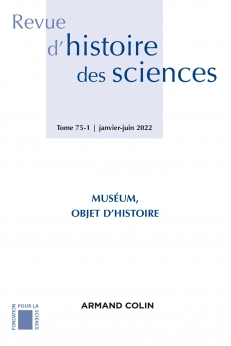
REVUE D'HISTOIRE DES SCIENCES (1/2022)
Pour acheter ce numéro, contactez-nous
Recevez les numéros de l'année en cours et accédez à l'intégralité des articles en ligne.
En 1896, dans Matière et mémoire, le philosophe Henri Bergson développe une théorie des rapports entre le cerveau et la pensée fondée sur une interprétation des aphasies, qu’il présentera durant toute sa vie comme une contribution positive à la recherche scientifique. Les théories unitaristes du docteur Pierre Marie, puis les théories globalistes de Raoul Mourgue, sembleront en effet lui donner raison et bientôt Bergson acquerra la réputation d’avoir devancé la science. L’étude de la réception de ses hypothèses en neurologie montre pourtant une réalité historique plus complexe. La querelle du bergsonisme joua, en fait, le rôle d’un marqueur de divisions dans un domaine, l’aphasiologie, déjà fortement clivé. En suivant ce fil conducteur des premiers articles iconoclastes de Marie, en 1906, jusqu’à la disparition de Mourgue, en 1950, nous prenons la mesure de ce que les neurologues et neuropsychiatres pouvaient attendre ou pas des hypothèses d’un philosophe parfaitement documenté, mais limité à des méthodes spéculatives.
In 1896, in Matter and Memory, the philosopher Henri Bergson developed a theory of the relationship between the brain and thought based on an interpretation of aphasia. He continued to present this theory as a positive contribution to scientific research throughout his life. The unitarism of Pierre Marie and then the globalism of Raoul Mourgue seemed to prove him right and Bergson soon acquired a reputation for having anticipated science. The examination of the reception of his hypotheses in neurology shows, however, a more complex historical reality. In fact, the debates around Bergsonism played the role of a marker of divisions within a field, aphasiology, which was already strongly divided. By following this thread from the first iconoclastic papers of Marie, in 1906, to the death of Mourgue, in 1950, we take the measure of what neurologists and neuropsychiatrists might or might not have expected from the hypotheses of a philosopher who was perfectly documented but limited his investigation to speculative methods.